
|
So as we all enjoy the 2025 UK Pride season, OutUK is taking the opportunity to celebrate people who've made a remarkable impact on the
lives of gay men in our country. A mixture of writers, actors, comedians, politicians, artists, performers, sportsmen, gay rights activists and a
mathematical genius - between them all they've had some extraordinary achievements.
In any Top 20 list you can only include 20 people, so some well known names didn't quite make it, but we think this is a comprehensive list of the
UK's most exceptional gay men. In alphabetical order...
| ||
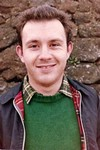
Photo: Johnny Orr |
Mark Ashton (1960-1987)Mark Ashton was born in Oldham, and moved to County Antrim in Northern Ireland, where he developed an interest in politics. He became a member of the Communist Party of Great Britain and then General Secretary of the Young Communist League. In 1984 he collected donations for miners who were on strike at the time with his friend Mike Jackson at the Lesbian and Gay Pride march in London. He then co-founded Lesbians and Gays Support the Miners (LGSM). His life was cut short by AIDS just three years later. He is portrayed on screen by actor Ben Schnetzer in the movie Pride, which told the incredible story of his achievements. | |
Alan Bennett (b.1934)Actor, author, playwright and screenwriter Alan Bennett was born in Leeds and educated at Oxford. He came to fame as part of the Beyond the Fringe revue at the Edinburgh Festival in 1960, along with Peter Cook, Dudley Moore and Jonathan Miller. He is the author of the play The Madness of George III and the screenplay for the movie starring Nigel Hawthorne. His plays The History Boys and The Lady in the Van have also been made into films. He has received numerous awards and honours including four BAFTA Awards, four Laurence Olivier Awards, and two Tony Awards. In 2005 he received the Society of London Theatre Special Award. | 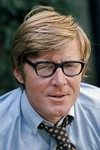
Photo: Allan Warren | |
Photo: NBC Television |
Dirk Bogarde (1921-1999)An iconic English actor and writer of his time, known for his good looks and supreme skill. Dirk Bogarde served as a commissioned officer in World War II but went on to become a major star and heart-throb. He was famous for movies such as The Servant (1963), King & Country (1964) and The Night Porter (1974). Bogarde lived with his long-time partner, fellow actor Anthony Forwood but concealed his sexuality throughout his life. He always believed that exposure would have ended his career at the time. That theme however was at the root of his best ever gay movie Victim (1961), which also starred his close friend and confidant Sylvia Syms. | |
Michael Cashman (b.1950)Michael Cashman is a British actor, dancer, politician, and LGBT rights activist. He's a member of the Labour Party, and served as a Member of the European Parliament for the West Midlands from 1999 to 2014, becoming Labour spokesman on human rights. He was elevated to the House of Lords in 2014 becoming Baron Cashman. He is one of the original founders of Stonewall, patron of Humanists UK, an Honorary Associate of the National Secular Society, a Patron of The Food Chain a London-based HIV charity and a patron of LGBT Labour. He's credited with the first gay kiss on TV in his role as Colin Russell in Eastenders. | 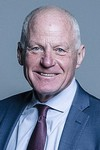
Photo: Chris McAndrew | |
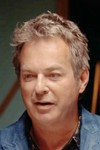
Photo: Marcus Liversedge |
Julian Clary (b.1959)A television legend known for his stand-up comedy wearing glam make-up and outrageous costumes, Julian often emphasizes gay themes and sexuality in his work. He is a regular performer on British TV and is most famous for presenting an award at the British Comedy Awards in 1993, when he walked on to a stage that looked a bit like Hampstead Heath, joking that he just been out the back “fisting” the then Chancellor of the Exchequer, Norman Lamont. Julian and his husband Ian Mackley lived for many years in a seventeenth-century manor house called Goldenhurst Farm once owned by Noël Coward, in Aldington, Kent. | |
Noël Coward (1899-1973)An enduring star of the 1930s, 40s, 50s, 60s and 70s, Noël Coward was a supremely talented actor, playwright and musical composer. He is best remembered for his play Private Lives (1930), his performance in the wartime movie In Which We Serve and his song Mad Dogs & Englishmen. In later life, Coward had various cameo roles in classic British movies of his day including Bridge on the River Kwai, Our Man in Havana and The Italian Job. Following the convention of his times, Noël Coward never came out in his lifetime. He was knighted in 1969 and the former Albery Theatre in London was renamed the Noël Coward Theatre in his honour in 2006. | 
Photo: Allan Warren | |
.jpg)
Photo: Jim Thurston |
Tom Daley (b.1994)Tom Daley showed exceptional skill and poise aged 7 when diving in his home town of Plymouth. He became Britain's youngest competitor aged 14 at the 2008 Summer Olympics and just 4 years later won bronze in London. He also took bronze in the 10m synchronized platform in 2016 in Rio and silver in Paris in 2024. His crowning achievement came at the 2020 Tokyo Olympics, winning gold in the men's synchronized 10m platform, alongside diving partner Matty Lee. Tom is well known as an advocate for LGBTQ+ rights and knitting, and his openness about his personal life with husband Dustin Lance Black and their two sons inspires many. | |
Steven Fry (b.1957)Steven is one of Britain's most popular entertainers. Actor, broadcaster, comedian, director and writer, Steven Fry came to fame in the 1980s as half of the comic double act Fry and Laurie, along with Hugh Laurie. His movies include Wilde (1997), when he played his idol, Oscar Wilde, A Fish Called Wanda (1988) and the Hobbit series of films. On TV he starred alongside Rowan Atkinson in Blackadder (1986–1989) and was the long‑time presenter of the TV show QI. Since 2011 he has served as president of the mental health charity Mind. He was knighted in 2025 for services to mental health awareness, the environment and charity. | 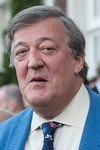
Photo: US Embassy London | |
.jpg)
Photo: Connaissance des Arts |
David Hockney (b.1937)David Hockney is an influential British artist who came to fame in the pop art movement of the 1960s. Exhibitions of his work, including prints, photographs and stage sets have been shown at the National Portrait Gallery, the Royal Academy and the Hepworth Wakefield. His best known work was featured in the semi-fictional 1974 documentary A Bigger Splash named after a painting from 7 years before. It depicted the split-second moment of a splash frozen on canvas, set against a building that was permanently there. In 2018, another of his poolside creations Portrait of an Artist (Pool with Two Figures) sold for $90m (£70m) at an auction in New York. | |
Elton John (b.1947)Once the hyper-glam Rocket Man, Elton John is one of Britain's most famous gay icons and respected musicians. Now Sir Elton, the composer and pianist from Pinner has been going strong since the 1960s. Apart from his music and support for Watford FC, Elton has been active in the battle against AIDS since the late 1980s through the Elton John AIDS Foundation. His hit albums mainly made in collaboration with song-writer Bernie Taupin include Goodbye Yellow Brick Road (1973), Captain Fantastic and the Brown Dirt Cowboy (1975), Made in England (1995) and The Captain & the Kid (2006). He married David Furnish in 2014. | 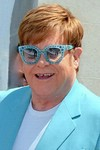
Photo: Georges Biard | |
Photo: Allan Warren |
Peter Mandelson (b.1953)Peter Mandelson is a Labour politician and was the 'spin doctor' behind Tony Blair's and Gordon Brown's governments in the 1990s and early 2000s. During the EU referendum of 2016 he was a staunch "Remainer". He's infamous for once mistaking mushy peas in a fish and chip shop for guacamole, even though he never did. He was elevated to the House of Lords as a Life Peer in 2008 and remained active in politics and political punditry. He was made HM Ambassador to the United States by Prime Minister Kier Stamer, negotiating the UK's recent trade agreement with the USA. He lives with his long-term partner, Brazilian Reinaldo Avila da Silva. | |
Ian McKellen (b.1939)Sir Ian McKellen is a star of both stage and screen. He was born in Burnley and educated at Cambridge, beginning his career on stage. In the 1970s and 90s Ian was a star of both the Royal Shakespeare Company and the Royal National Theatre, performing several lead roles in Shakespeare plays. His movie career includes such hits as The Lord of the Rings and X-Men, but his most famous gay role was alongside Brendan Fraser in Gods and Monsters. Its a partly fictionalised account of the last days of the life of the film director James Whale known for directing two Frankenstein movies, and it tells of a complicated relationship he has with his gardener. | 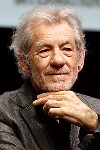
Photo: Gage Skidmore | |
.jpg)
Photo: Christopher Hopper Dist: Elektra Records |
Freddie Mercury (1946-1991)Freddie Mercury was born Farrokh Bulsara in Zanzibar and became lead singer of Queen, a group world famous for its rock anthems such as Bohemian Rhapsody, Somebody to Love, and We Are the Champions. Regarded as one of the greatest singers in the history of rock music, he would often use all of a four-octave vocal range. His flamboyant performances became legendary and are portrayed in the hit movie Bohemian Rhapsody. Freddie died of AIDS in 1991 and his benefit concert at Wembley Stadium in 1992 reached a global audience of an estimated one billion people raising money for the Mercury Phoenix Trust, the singer's AIDS charity. | |
George Michael (1963-2016)George Michael came to fame as one half of pop duo Wham in the 1980s. His debut solo studio album, Faith (1987), won the Grammy Award for Album of the Year and became one of the best-selling albums of all time, having sold over 25 million copies worldwide. His personal life, drug use, and legal troubles made headlines following an arrest for public lewdness in 1998. He performed his final concert at London's Earls Court in 2012 and sadly died of heart disease on Christmas Day in 2016 at his home in Goring-on-Thames, Oxfordshire. George was an active LGBT rights campaigner and HIV/AIDS charity fund raiser throughout his life. | .jpg)
Photo: Albert Loutsberg | |
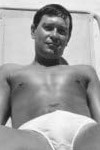
Cover Picture from Joe Orton - Tot el teatre I |
Joe Orton (1933-1967)Joe Orton was a dramatist, author, and diarist born in Leicester and famous for his dark comedies Entertaining Mr Sloane and Loot that shocked and amused theatergoers in the 1960s. When not writing he and his long-time partner and mentor Kenneth Halliwell amused themselves with pranks and hoaxes. A volume of poems by Sir John Betjeman borrowed from the local library was returned with a new dust jacket featuring a nearly naked, heavily tattooed man. He also created Edna Welthorpe, Mrs - an elderly theatre snob who would stir controversy over his plays. Joe Orton was murdered by Kenneth Halliwell in 1967, just before Halliwell committed suicide. | |
Chris Smith (b.1951)Lord Smith of Finsbury was the first openly gay male British MP and first to publicly acknowledge his status as HIV-positive. He came out in 1984 during a rally in Warwickshire against a possible ban on gay employees. He reportedly began his speech: "Good afternoon, I’m Chris Smith, I’m the Labour MP for Islington South and Finsbury and I’m gay." In 2005 he revealed that he had been diagnosed as HIV-positive more than 15 years before. He was part of the Government that equalised the age of consent, abolished Section 28 and introduced civil partnerships. He became a vice-president of the Campaign for Homosexual Equality in 2009. | 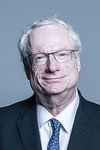
Photo: Chris McAndrew | |
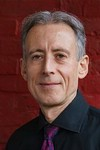
Photo: Colin |
Peter Tatchell (b.1952)Peter Tatchell is an Australian-born British human rights campaigner, best known for his work with LGBT social movements. He was selected as the Labour Party's parliamentary candidate for Bermondsey in 1981 and then denounced by party leader Michael Foot for supporting extra-Parliamentary action against the Thatcher government. In the 1990s he campaigned for LGBTQ rights through the direct action group OutRage!, which he co-founded. He attempted a citizen's arrest of Zimbabwean President Robert Mugabe in 1999 and again in 2001. In 2010 he was recommended for a life peerage but it was said that he turned it down. | |
Alan Turing (1912-1954)Alan Turing is the mathematical genius who helped to crack the German Enigma codes in World War II. He is thought of as a progenitor of computer science and artificial intelligence. In 1952 Turing "admitted" his homosexuality, which was in those days a crime in the UK, and underwent chemical castration, in the form of an injection of the female hormone oestrogen. HM Queen Elizabeth II pronounced Turing pardoned in August 2014. It was only the fourth royal pardon granted since the conclusion of the Second World War. A statue of Alan Turing in Sackville Park near the Gay Village in Manchester honours his life and achievements. | 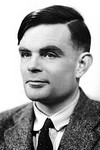
Photo: Elliott & Fry | |
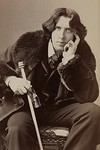
Photo: Napoleon Sarony |
Oscar Wilde (1854-1900)"I have nothing to declare but my genius," Oscar Wilde is quoted as saying as he arrived in New York in 1882. He is most famous for the plays The Importance of Being Earnest and Lady Windermere's Fan and his novel The Picture of Dorian Gray. Married with children in his youth, Wilde was actively homosexual during his later life, falling in love with the son of the 9th Marquess of Queensberry, Lord Alfred Douglas. He was arrested and convicted of gross indecency and sentenced to two years hard labour in 1885. His experiences in confinement gave birth to The Ballad of Reading Gaol and also hastened his death in exile and in poverty in Paris. | |
Kenneth Williams (1926-1988)Kenneth Williams was best known for his comedy roles on radio, TV and film and in later life as a raconteur and diarist. He starred in 26 of the 31 Carry On movies, and on the radio starred alongside Tony Hancock and Kenneth Horne, as well as being a frequent contributor to BBC Radio 4's panel show Just a Minute. His personal life was largely celibate after a series of unsuccessful homosexual dalliances. A comic genius who made millions of people laugh, his own life was marked by loneliness and despair. He kept a series of diaries and letters throughout his life that on publication at the end of the 2000s achieved universal posthumous acclaim. | 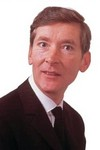
Cover of The Kenneth Williams Letters | |
|
So that's OutUK's rundown of the Top 20 UK Gay Men that made us all proud! Of course there were loads of people we couldn't include such as: W. H. Auden, Quentin Crisp, Rupert Everett, Boy George, Paul O'Grady, Nigel Hawthorne, Christopher Isherwood, Derek Jarman, Graham Norton, Terence Rattingan and just so many more... but that would take at least a Top 30 or more to achieve. All Pictures: CC BY-SA 4.0 via Wikimedia Commons or Public domain via Wikimedia Commons | ||

The Progress Pride Flag created by Daniel Quasar |
OutUK has several other features which celebrate our Pride including:
|